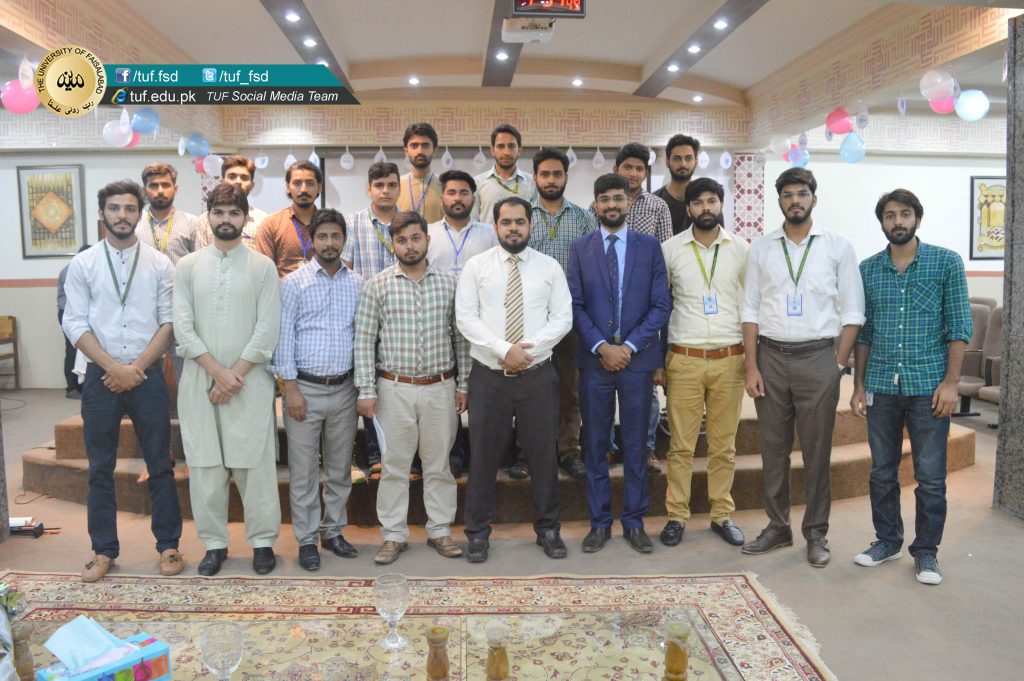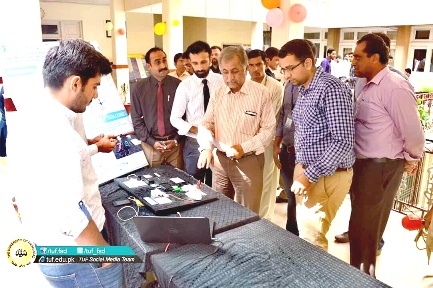
DEPARTMENT OF ELECTRICAL ENGINEERING
FACULTY OF ENGINEERING & TECHNOLOGY
VISION
The vision of Department of Electrical Engineering is to be recognized as a leader in electrical engineering education and research through excellence in education and targeted research themes in emerging areas.
MISSION
The mission of Department of Electrical Engineering is to prepare technically strong engineering students who can contribute effectively towards the nation, society, and industry through innovation, research, entrepreneurship, leadership, and healthy lifelong learning attitude.
OBJECTIVE:
- To transform youth of the country into leading and inspiring engineers equipped with latest trends and knowledge in the field of Electrical Engineering, who should be able to serve the local as well as national industry with competence.
- To provide requisite base for the graduating engineers who can pursue higher education at National as well as International level.
ABOUT US
ACCREDITATION
Department of Electrical Engineering is accredited for the following batches.
- Bachelor of Electrical Engineering (Telecommunication or Electronic) - (From Intake of Batch Fall-2002 upto Spring 2004-only such graduates who have completed remedial education verified by the university), and Intake of Batch Fall- 2004 upto 2005.
- Bachelor of Electrical Engineering (Electronics) (From Intake of Batch 2006 upto 2011).
- Bachelor of Electrical Engineering (Computer System) ( Intake of Batch 2011 only).
- Bachelor of Engineering in Textile (From intake of Batch 2005 upto 2010).
- Bachelor of Chemical Engineering (From Intake of Batch 2010 to 2015).
- Bachelor of Electrical Engineering (Power) (From Intake of Batch 2012 to Fall-2013).
- Bachelor of Electrical Engineering (Electronics/Computer Systems/Power) (From Intake of Batch 2012 to 2016).
- Bachelor of Electrical Engineering (Electronics/Computer Systems/Power) (From Intake of Batch 2017 to 2018)
- Bachelor of Electrical Engineering (Electronics/Power) (Intake of Batch 2019)
BEE (POWER ENGINEERING)
This program is designed to train students in modern Electrical Power Engineering. It offers a high-level education in close co-operation with industry. Students will gain the ability to understand and cope with the various problems of Electrical Power Engineering by the application of scientific methods, including the ability to adapt new scientific findings for the use of Electrical Power Engineering. Students will learn how to apply their knowledge of mathematics and Electrical Engineering to technical problems, and then solve problems in a global social and economic context.
BEE (ELECTRONICS ENGINEERING)
This program teaches candidates how to apply electronics technology to design, test and troubleshoot advanced devices and systems. It trains students in basic electrical theory and hands-on application, subsequently moving on to increasingly complex electrical systems, platforms, telecommunication systems and circuit design. Graduates can direct technicians and assist engineers in designing, troubleshooting and maintaining electronic devices and networks.
BEE (COMPUTER SYSTEM ENGINEERING)
This program covers topics on the engineering of computer software and hardware systems: techniques for controlling complexity; strong modularity using client-server design, virtual memory, and threads; networks; atomicity and coordination of parallel activities; recovery and reliability; privacy, security, and encryption; and impact of computer systems on society. Case studies of working systems and readings from the current literature provide comparisons and contrasts.
PROGRAMING EDUCATIONAL OBJECTIVES
Following are the PEOs for electrical engineering graduates:
PEO-1: To equip electrical engineering students with knowledge, skills and ability to investigate complex engineering problems.
PEO-2: To develop research driven professionals having effective communication skills to fulfil modern technological needs of industry.
PEO-3: To nurture ethically, socially and environmentally responsible engineers who would feel the need to contribute towards society and humanity at large.
PEO-4: To inculcate entrepreneurial and innovative mindset in the students for sustainable growth and development.
PROGRAM LEARNING OUTCOMES:
1. Engineering Knowledge
An ability to apply knowledge of mathematics, science, engineering fundamentals and an engineering specialization to the solution of complex engineering problems.
2. Problem Analysis
An ability to identify, formulate, research literature, and analyze complex engineering problems reaching substantiated conclusions using first principles of mathematics, natural sciences and engineering sciences.
3. Design/Development of Solutions
An ability to design solutions for complex engineering problems and design systems, components or processes that meet specified needs with appropriate consideration for public health and safety, cultural, societal, and environmental considerations.
4. Investigation
An ability to investigate complex engineering problems in a methodical way including literature survey, design and conduct of experiments, analysis and interpretation of experimental data, and synthesis of information to derive valid conclusions.
5. Modern Tool Usage
An ability to create, select and apply appropriate techniques, resources, and modern engineering and IT tools, including prediction and modeling, to complex engineering activities, with an understanding of the limitations.
6. The Engineer and Society
An ability to apply reasoning informed by contextual knowledge to assess societal, health, safety, legal and cultural issues and the consequent responsibilities relevant to professional engineering practice and solution to complex engineering problems.
7. Environment and Sustainability
An ability to understand the impact of professional engineering solutions in societal and environmental contexts and demonstrate knowledge of and need for sustainable development.
8. Ethics
Apply ethical principles and commit to professional ethics and responsibilities and norms of engineering practice.
9. Individual and Teamwork
An ability to work effectively, as an individual or in a team, on multifaceted and /or multidisciplinary settings.
10. Communication
An ability to communicate effectively, orally as well as in writing, on complex engineering activities with the engineering community and with society at large, such as being able to comprehend and write effective reports and design documentation, make effective presentations, and give and receive clear instructions.
11. Project Management
An ability to demonstrate management skills and apply engineering principles to one’s own work, as a member and/or leader in a team, to manage projects in a multidisciplinary environment.
12. Lifelong Learning
An ability to recognize importance of, and pursue lifelong learning in the broader context of innovation and technological developments



